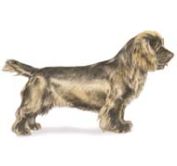Sussex Spaniel - He's A Winner!
The Sussex Spaniel is a somewhat rare breed though it has a long-standing history in the county of Sussex in England, where it was developed during the eighteenth century.
 Courtesy Flickr
Courtesy FlickrDuring World War II, it could have been in danger of extinction were it not for the efforts of Joy Freer, who kept the breed going from a small gene pool.
The Sussex was originally bred for hunting in the field as a gun dog.
His appearance is long and low in profile and supports a solidly built compact body covered with a very full coat. It is no coincidence that his physical attributes and full furnishings are well suited for flushing game in dense undergrowth.
As a result, he has earned an excellent reputation in the field.
He was registered by the UK Kennel Club soon after it was founded in 1872. The Sussex was also one of the founding breeds recognized by the American Kennel Club in 1884.
The Sussex Spaniel "Bean" has the distinction of being the Best In Show Winner at the renowned Westminster Dog Show
in 2009. Watch him enjoying the moment.
Physical Stats

Height: 13 to 15-1/2 inches
Weight: 40-45 lbs.
Color variations: The standard is Golden Liver- although there have been variations in the past
Coat and Care
The Sussex Spaniel has an abundant coat with a good amount of feathering on the ears, legs, underside and tail. The hair around the eyebrows is also rather pronounced.
Despite its fullness, the coat is fairly easy to take care of with a thorough brushing about twice a week and should be done regularly to avoid dealing with mats and tangles.
Also, importantly, look inside the long ears to check for signs of
parasites or infection and keep them clean and free of excessive hair.
In fact, handling of the ears should start from an early age as this will be an ongoing part of grooming that they need to get used to.
Other routine tasks include nail clipping and dental brushing.
Personality and Traits
While the Sussex Spaniel's personality is not quite as exuberant as others in spaniel lines, he is a lovely dog with a demeanor that is calm and gentle and a character that is steady and loyal.
The Sussex Spaniel is very loving and sociable with everyone and has definite protective traits toward his family, but is otherwise a more laid back companion.
Working out in the field is a different matter. The Sussex comes into his own as a hunter extraordinaire with nose to the ground and enthusiasm in high gear.
If kept mainly as a family pet, his needs for exploring the great outdoors should not be overlooked.
Training a Sussex mainly requires fairness, consistency and patience.
There is no lack of intelligence, but a wee bit of stubbornness.
Health of the Sussex Spaniel
With good care pet parents can look forward to enjoying their dog for up to 14 years and possibly even 16.
Health concerns that may affect the breed during their lifetime include:
- Hip dysplasia
- Heart Conditions
- Birthing difficulties that may require caesarean delivery
- Spinal Disc Herniation aka Intervertebral Disc Syndrome
- Ear Infections (common to spaniel dog breeds)
- Skin Conditions such as hot spots
- Bloat
Sussex Spaniels can also be carriers of a PDP1 gene mutation resulting
in PDP1 Deficiency. This condition affects a dog's response to exercise.
Fortunately, breeders can now screen for this with a genetic test that
has been developed. More about that here at VetGen.
Anyone seeking a puppy should request information about health testing the breeder has completed on the puppy's parents.
How Active is the Sussex?
This dog needs a fair amount of regular exercise to keep from becoming
overweight - about two hours a day when mature according to the breed
club.
Some of this can be met by romping in the back yard as well as opportunities to have a swim.
Ideal Living Space
As long as his exercise needs are being me, the Sussex is very adaptable and will live quite happily in either house or apartment.
That being said, because he is an active breed, an outside area for play and training is the best.
The Sussex With Children?
An excellent companion for older children that have been instructed in the considerate handling of pets. This breed won't
tolerate mishandling or teasing.
While Sussex Spaniels are known to be both mellow and gentle, they do need to be well-socialized
as a puppy and given obedience training.
As with any breed of dog, interactions with children should always be in the presence of
an adult.
Suitable For Seniors Or Less Active Families?
With his loyal, loving and calm nature, the Sussex Spaniel is an ideal breed for seniors or those less active, except...
Having someone available to regularly exercise the dog is the main and necessary condition.
Share Your Knowledge And Dog Pictures
Do you have a Sussex Spaniel? If you do, we know you must be proud to own this calm and somewhat rare dog breed.
We would love for you to share your dog's pictures and his story as well as your knowledge about the breed in general.
You can upload photos and tell your dog's story here.
For inspiration, read some of the stories already submitted by other dog lovers.
Further Reading

Sussex Spaniel Special Rare-Breed Edition
Current information about the care and training of this unique and intelligent
sporting dog. Covers breed history, characteristics and pet attributes, breed Standard, grooming, puppy, care,
house training, nutrition and feeding, basic obedience training and proper health care. Many photos.
 Also, conveniently available to read on Kindle.
Also, conveniently available to read on Kindle.
Image: https://www.flickr.com/photos/wakethesun/14221561289/in/pool-sussexspaniels/ License: 2.0 Generic (CC BY-NC-ND 2.0)

